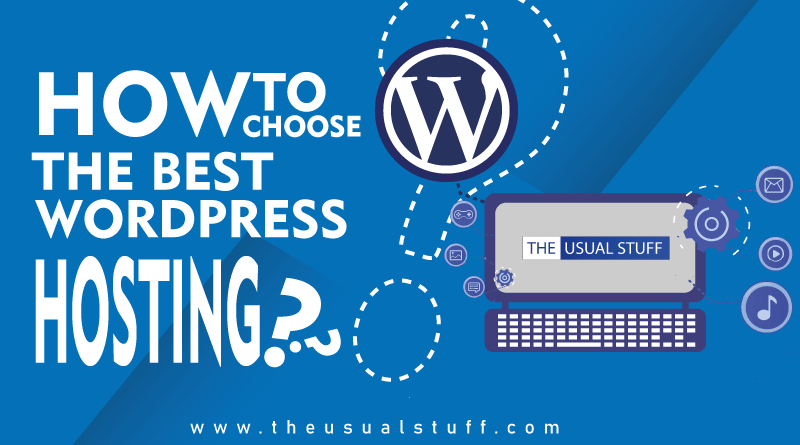How to pick the right WordPress hosting service?
So you’ve decided to kick-start your blogging career using WordPress? That’s a great choice. However, a conundrum that you must now be facing is choosing the best WordPress Hosting service to host your blog.
The website hosting market is quite saturated right now and the “reseller” option offered by major web hosting companies has made sure that the new web hosting services keep sprouting every now and then, promising heavens and moons to its users.
Right now, there are literally thousands of WordPress hosting out there that will cause Analysis-Paralysis to any newbie and leave them confused.
Of course, Google is your best pal to find the best hosting and you plan to do simple research before taking the leap of faith but there’s a catch.
Although Google is getting smarter but there are two major issues with their search results.
First, they’ve started displaying more ads which means that you’re not necessarily shown the best result. In fact, the candidate who has spent more money on Google Ads may be popping in front of you.
Second, even if the result is “organic” it does not mean that the web host addresses your needs as their ranking might be the result of some extraordinary efforts taken by their SEO Agency. Search engine optimization strategies like content SEO, technical and on-site SEO can effectively improve the organic search results.
So the question remains that how can you choose the best hosting service for your WordPress blog? The answer comes through research, whether that be from looking into the web hosting deals or from reading reviews of the options out there.
How to separate noise and music from all this clutter?
In this article, we’ll see what features to look for when trying to sign up for a web host. Most importantly, I’ll also keep in mind that not everyone is technically well-equipped so I’ll also mention what questions they can ask to buy the optimum hosting plan for their WordPress blog.
How Not to Get Fooled by Web Hosting Companies?
Many people have this fear back of their head that they will be taken for a ride by the web hosting companies overselling them features they never really wanted thus forcing them to pay the premium rates.
In this article, I’ll try to equip you with the basic knowledge so that you can buy a web host for your WordPress website like a PRO, paying the optimum price for the right features.
Moreover, I’ll also share a few forums and Facebook pages that are doing a great job to educate people about web hosting in general and WordPress hosting specifically.
Cost of Choosing the Wrong WordPress Hosting
Consider choosing the best WordPress hosting as a normal business decision. And just like any other business decision, when you make a mistake, the losses are tangible and monetary.
For instance, if you host your website on a slow host, you will lose visitors and consequently, potential income (more on this below), however, on the other hand, if you sign up for a premium WordPress Hosting you could end up paying for unnecessary features that you never wanted. Ultimately, which would mean you had to pay hefty bills for premium services when even a simple web host would have done the same job very well for you.
Thus overrunning your budget!
Furthermore, if you are somehow convinced to sign up for a web host that does not have a great uptime history, again, this could result in visitors lost and getting penalized by Google.
I’m sure you don’t want to be in the bad books of Google!
The point is that whenever you go out shopping for WordPress hosting there are two major factors that you need to keep in mind.
- What are your requirements?
- What features does a web host offer and at what cost to address your requirements?
Therefore, the best route to choosing the best WordPress hosting service is to have a detailed assessment of your own requirements first.
What are your WordPress Hosting Requirements?
Being the most important part, you need to ask some simple and basic questions from yourself and make sure that you answer them objectively.
Here are a few of them.
1. What’s your blogging niche?
That’s an easy question to answer. Your niche decides how heavy resources you may need.
Is it an eCommerce website?
If yes, then you may need to be warier about the uptime, and speed of your web hosting servers. Not so much when you’re a dentist or an accountant who does not rely on a website to attract clients/customers.
Similarly, an eCommerce website requires more storage space as compared to say, a simple blog with informative articles.
To give you another example, if you’re looking forward to creating a WordPress website for your local business, say a dentist or an auto-repair shop, or even a website sharing local community news, then you can manage very well with a light-weight and cheap WordPress Hosting.
2. How much traffic is your website going to receive?
This is an important question and of course, does not require a hard number. Even just a vague idea will do quite well.
The purpose of this question is that the visitors consume resources in terms of bandwidth which is provided in limited amount by many web hosts companies.
In a situation the visitors consume all your bandwidth, these web hosts start blocking any more visitors from visiting your website and start showing Error 509.

Therefore, you need to know how much traffic your website can receive. The best way to do is to pick up top-3 of your competitors blogging in the same niche and assess their traffic.
I normally use SEMRush which not only provides the necessary details in their Domain Overview section but also gives away other vital information as well.
All you have to do is to just enter your competitor’s web address (URL) in the domain overview field and hit Enter.

Many web hosts like DreamHost provides information about how much traffic can their particular package entertain.
Once you know how much traffic is your website going to receive, both in the near future and after “X” number of years, it’ll be easier for you to narrow down the list.
3. How technically well-equipped are you?
This is a necessary question because over the course of choosing WordPress hosting to actually using the service you will have an upper hand if you have the great technical know-how of server management.
For instance, there are companies (like CloudWays) that allow building your own server stack.
Of course, a “noob” cannot handle this feature unless he’s willing to undergo a grueling cycle of reading/watching tutorials, testing, and failing first.
Similarly, do you want to buy your own VPN (Virtual Private Network)? If yes, then you need to have more than basic knowledge of managing servers as compared to say, when you opt for Shared servers or Managed WordPress hosting.
If you think that you’re not a total newbie and can perform basic tasks such as updating your WordPress version then you can buy shared hosting, however, if you don’t want to complicate your life any further by taking care of these minion tasks such as updating your WordPress, etc. and want the web host company to take care of them for you, then you need to buy Managed WordPress Hosting.
4. What is the geo-location of your traffic?
You need to be able to answer this question because the primary location of your visitors plays a key role in server speed.
If you choose a server nearer to your traffic’s location, the web pages will render quicker as compared to when you render the page from a server on a different continent.
Quick page rendering means that not only the visitors will stay on your website but Google will also start looking at your favorably.
5. What is your budget?
I’ve kept the best for the last and this is a common sense question that applies to any buying decision and web host is no different.
Before choosing a WordPress hosting, you need to have a good idea of how much you can afford.
Just to give you an idea, WordPress hosting can cost from as low as $1.99/month to $199/month (or even higher in some rare cases). It all depends on what requirements you have.
So make sure that you have a clear idea of how much of your “savings” are you willing to part ways with.
Features to look for in a WordPress Hosting service
After a good introspective session above, it’s time to look outward.
WordPress hosting comes in all shapes and sizes. Different companies offer different features, which I agree, can be quite overwhelming.
So the question is which web hosting features are essential to run a successful WordPress website while others, although are important but still, are not deal-breakers.
I’ve divided them into Mandatory and Non-Mandatory features.
Mandatory Web Hosting Features
1. Server Uptime
This feature gives you an idea about the time period your website will most likely stay online or in other words, goes offline (downtime) due to server issues.
Mentioned in terms of percentages, you need to aim for a higher number.
Just like A2 Hosting, which hasn’t gone down even for a second in the last 6 months which means their uptime score is 100%.
Of course, 100% is the best but since this is the perfect score, web hosts can guarantee it only for a limited time period as sooner or later, every server goes down.
The point is how quickly they go live after a hiccup.
Therefore, I’d advise you to look for web hosts that guarantee uptime percentage of not lower than 99.9%
Now, the question is that how can you check the uptime record of any web host?
Well, the web hosts themselves mention this score on their websites, however, since we need a third-party’s word on it, there are many websites that provide this service.
For e.g. I use a free website service called, HostScore.net to check this metric. They have a huge database of different web hosts analyzing server uptime from 10 different locations.
Even better, you can go back by multiple years in time to get even a better idea.
For beginners, I reckon it’s a great tool and you should definitely check it out.
2. Server Speed
Ever since Google has declared the server speed an important ranking factor, we can no longer ignore it when buying a Web host.
In fact, not just for the search engine rankings, the speed of the server really enhances the user experience as well.
According to a research, 53% of mobile users leave a website if it does not load within 3 seconds. This means that being lax in this area can really cost you big time.
Aim for web hosts that provide downloading speed of less than 200 ms. Most importantly, make sure that you check the speed of the servers in the locations from where you’ll receive the major chunk of the traffic.
For e.g., if your target audience is from any European country then check the server performance of that web host in that continent or even that country, to be specific.
Checking the server speed of any particular web host in say, North America won’t cut it.
3. 24/7 Quality Support
Another mandatory feature that you should be aiming for is 24/7 quality support.
Almost all web hosts now provide this facility. In fact, some even go one step further. Their support is not only 24/7 but also 365 days a year. Like A2 Hosting and InterServer.
Another support feature (though shouldn’t be mandatory) that you can aim for is if they provide localized support.
Keep one thing in mind. During the entire period of using any web hosting service, you will have to get in touch with their support team multiple times for various reasons.
What many web hosting services do is that they outsource their support function overseas to cut cost thus compromising on the quality of support. As a result, you may see either delayed response or fruitless interactions with the support team because other than responding to the run-of-the-mill queries, they are not trained to address the technical ones.
What you can ask for is to either look for localized support (e.g. InMotion Hosting) or see if the web host provides dedicated WordPress specialists to address your concerns (e.g. DreamHost).
The best way to check the quality of support of any particular web host is not just reading website reviews, but also the comments beneath them. Also, TrustPilot is a good source of such information.
An interesting aspect that I’ve observed is that the majority of the user feedbacks are either about the quality of support or billing practices. So you will have ample information about their support staff if you review these websites.
4. Security
Of course, you don’t want to wake up one day only to see all your hard work has been compromised. Stolen or deleted.
Security is another important aspect that cannot be ignored so I’d suggest you be watchful here. Check out what security stacks they offer.
Some basic questions you can ask is:
- How often does the web host take backups of their customer websites? Confirm if they’re automatic?
- What malware and hack-proof measures are in place?
- How do they prevent DDoS (Distributed Denial of Service) attacks?
- To what extent does a web host provide domain privacy to obscure your personal information
- Although many web hosts develop their own security systems and firewalls, there are some that partner with 3rd party security companies as well. Such as DreamHost provides SiteLock security support. So you can review these third parties as well and see how effective are they.
5. Scalability
By scalability, I mean how conveniently you can upgrade or downgrade your resources.
You need this feature as the resources that your website consumes vary according to the traffic it receives which can change over time. Therefore, it’s sensible that you have the flexibility of scaling up in case there’s a spike in traffic, to avoid any downtime.
This does not only include an increase in bandwidth but also the processing power (RAM), storage space, and the ability to install different apps that can handle heavy traffic.
Normally, cloud-based solutions like CloudWays are the best to handle scalability. Then comes the Dedicated Servers. But both these solutions are relatively expensive as compared to the shared hosting which does not scale up as easily as the above two but is more economical.
The point being here is that you make sure to perform this thorough cost-benefit analysis before making your pick.
6. Cost of Web Hosting
Finally, what you need to be careful about is the cost. Once you have lined up all the features lists make sure that you have a good look at the prices as well and compare them with all your shortlisted candidates.
Just to give you an idea any decent web host with the above basic features should cost you between $3.95/month to $20/month.
![]()
When analyzing cost keep in mind that most of the web hosts display prices that are introductory and only for the first term. This first term could mean anything from 3 months to the whole first subscription period. After the first term, the prices climb up by many folds. So make sure you keep that in mind.
So far, I’ve only seen InterServer that guarantees that their prices remain constant as long as you stay with them. Even for multiple terms.
Non-Mandatory Web Hosting Features
As I said earlier, these are the features that shouldn’t be deal-breakers but having them along with your package adds more value. These are:
1. Email
While there are many hosts that offer email facility, still there are some web hosts that do not offer it at all. Quite interestingly, most of them are Premium WordPress Hosting. Of course, this does not mean that you cannot integrate email from other sources but the question is do you want to keep running around not only looking for the features but also a technical resource to patch up everything for you?
Therefore, make sure that you ask the web host if they provide the email feature. If yes, then how many email addresses are allowed, if it’s free, or do they charge something, and what email clients they offer (e.g. Gmail, Outlook, etc.)
2. SSL Certificate
SSL (Secure Socket Layer) Certificates have now become somewhat mandatory. Especially ever since Google has declared that it will mark every website without an SSL certificate as Unsafe.
Just to give you a brief idea about SSL certificates, these certificates tell the users that data to and from the website is encrypted. Therefore, even in case of a “leakage” the data is not readable.
To see if a website has an SSL certificate you can check the address bar in your web browser.
If the web address has an additional “s” after http or if you can see a grey or green padlock before the web address, this means that the website is secured.
While all the web hosts now provide SSL (Secure Socket Layer) certificate and many do that without charging any cost, it’s important that you make this clear before signing up.
3. CDN (Content Delivery Network)
Remember what I said above about the geo-location of your target audience?
From a “speed” perspective, it’s always good to serve pages to your visitors from the servers nearest to them but what if your visitors come from a wide range of countries? In fact, not only different countries but different continents?
What would you do then?
Well, in that case, CDNs come to your rescue.
Very briefly, what CDNs do is that they distribute the data among different servers and use the servers nearer to a particular visitor to render the webpage.
So when you sign up for WordPress hosting, make sure you ask them if they deploy CDNs.
Almost all web hosts now provide CDN.
In fact, some web hosts like DreamHost even go one step further and provide a whole suite of plugins like JetPack which provides CDN not just for your content but also for image rendering as well.
4. SSD Storage
Although, nowadays all the web hosts provide SSD infrastructure but it’s always good to ask and confirm it.
SSD Storage facility enables better speed as the data transfer speeds up in SSD disks as compared to the traditional HDD disks.
I’ve already discussed above how speed enjoys a central position when it comes to ranking higher in search engines.
5. Free (White Glove) Website Migration
If you’re a “first-timer” then obviously, this isn’t for you. However, if you already have a WordPress blog hosted somewhere and want to make a switch then you can ask your new web hosting service if they offer free migration and most importantly, how much technical support do they provide in doing so.
What white-glove here means is that all the technical stuff is handled by the hosting team and all you have to do is to provide them with the necessary information and then sit back and relax.
6. Money-Back Guarantee
Most importantly, when choosing WordPress hosting, just to be on the safe side, do check the length of their money-back guarantee.
Of course, when you’re testing out their features, you need an assurance that your money will not go in vain, and since all the features cannot be tested on the first day, you need some respite to experience the services.
So far, the best money-back guarantee that I’ve seen is offered by InMotion Hosting (90-days) whereas the majority of the web hosts offer a 30-day money-back guarantee. However, this guarantee does not apply to the domains.
Forums & Platforms to Seek Web Host-Related Answers
Although I’ve tried to be as detailed as possible but I agree, it’s almost impossible to address every concern.
In that case, very quickly, I’m mentioning forums and social media pages that I frequently visit and you can also join to seek answers to your web hosting-related questions.
- r/webhosting – Reddit page
- WP Speed Matters – A highly active page with speed being the center point but you can discuss other WordPress-related web hosting issues as well.
- Web Hosting Talk – Online forum to discuss web hosting issues
Let’s Summarize
I know the above information can be quite overwhelming for many to digest so here’s a nice briefer to go through the above content quickly.
When deciding which WordPress hosting to choose from, here’s what you need to do:
- Ask yourself what your requirements are. Such as:
- What is your niche?
- What will be your monthly traffic?
- How technically well-equipped are you?
- What is the primary location of your traffic?
- What is your budget?
- Then, look for the following features in a web host provider
- What is the server uptime record of the web hosting service?
- What is the average server speeds of their different servers across different locations?
- Do they provide 24/7 support? Even better, is the support a team of WordPress specialists and localized?
- How good is their security?
- Is the hosting solution scalable?
- What is the cost (both introductory and after the first term)?
- Finally, to make an even more refined decision you can check the following features which though should not be deal-breakers but it’s always good to have them in your hosting solution.
- Does the web host provide email as well? If yes then is it free? How many email addresses are allowed?
- Do you get a free SSL Certificate for your WordPress website?
- Does the host provide a Content Delivery Network (CDN)?
- Is the storage infrastructure SSD?
- Can you migrate your WordPress website to the new host free with minimum input?
Final Word
I hope this will serve as the best source for choosing the most optimum WordPress web host among a plethora of web hosts out there. However, since I’ve been writing WordPress Web Hosting reviews myself as well, you can check them out just in case you’re interested in any specific host.
Or if you want me to suggest a web host best suited for your requirements, why not Contact Me and let me know what are you looking for?




